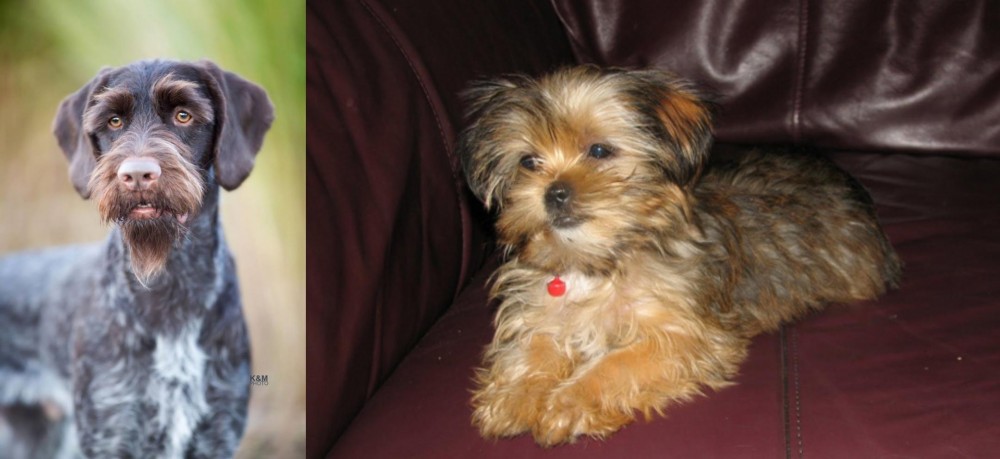 Petzlover
Petzlover German Wirehaired Pointer is originated from Germany but Shorkie is originated from United States. German Wirehaired Pointer may grow 44 cm / 18 inches higher than Shorkie. German Wirehaired Pointer may weigh 25 kg / 56 pounds more than Shorkie. Both German Wirehaired Pointer and Shorkie has almost same life span. German Wirehaired Pointer may have more litter size than Shorkie. Both German Wirehaired Pointer and Shorkie requires Moderate Maintenance.
German Wirehaired Pointer is originated from Germany but Shorkie is originated from United States. German Wirehaired Pointer may grow 44 cm / 18 inches higher than Shorkie. German Wirehaired Pointer may weigh 25 kg / 56 pounds more than Shorkie. Both German Wirehaired Pointer and Shorkie has almost same life span. German Wirehaired Pointer may have more litter size than Shorkie. Both German Wirehaired Pointer and Shorkie requires Moderate Maintenance.
 Medium to large sized, the German Wirehaired Pointer is a griffon type dog breed hailing from Germany and developed for hunting purposes in the 19th century.
Medium to large sized, the German Wirehaired Pointer is a griffon type dog breed hailing from Germany and developed for hunting purposes in the 19th century.
Known as the Drahthaar in Germany, the dog is a mix of griffon, Deutscher Stichelhaar, German Shorthaired Pointer, Deutscher Kurzhaar as well as the Pudelpointer.
He was imported into the United States in the 1920s, and it was in 1953 that the German Drahthaar Club of America was formed.
 The Shorkie is a mix between a Yorkshire Terrier and a Shih Tzu. This little dog actually thinks he’s quite big. He is a great watchdog and a barker, and he is a loyal and loving member of his family. He will let you know if he thinks something is going on that shouldn’t be.
The Shorkie is a mix between a Yorkshire Terrier and a Shih Tzu. This little dog actually thinks he’s quite big. He is a great watchdog and a barker, and he is a loyal and loving member of his family. He will let you know if he thinks something is going on that shouldn’t be.
This hybrid combines two breeds known for their good looks, cuteness and personalities. Shorkies get their watchdog instincts and their loyalty to their people from the Shih Tzu and their personalities and good looks from the Yorkie. This designer breed has no known standard and every puppy is different, but traits from its founding breeds will remain. Both breeds have great personalities.
Regardless of the differences within the litter, because the personalities and adorableness of the two founding breeds are equal, all of the puppies will have those characteristics. They will all be energetic, playful and think they are big dogs. They will all love people and especially kids – playing and watching over them.
The Shorkie is intelligent, trainable, and snuggly. They will also have the stubborn trait that the two founding breeds can show at times. Developed in the United States, this crossbreed is extremely popular even though they have been in existence for only ten years or so. Breeders in the U.S. began to mix these two breeds in order to develop a cute, friendly and intelligent little dog that will cuddle on your lap – perfect lap dog.
Even if we already have breeds similar to the Shorkie, its development allows breeders to diversify and improve the genetics of the dogs. It is important that these be responsible breeders whose intentions are not financial but to legitimately improve the positive traits of each breed while sorting out the undesirable or weak traits. This is the positive side of the new designer breeds.
Even though it is still being developed, at least the Shorkie seems to be a success story for designer breeds as a loving, popular little dog. It will take a lot more time and a lot more development before the Shorkie becomes an actual recognized breed. At the moment it remains a hybrid, a crossbreed, a so called designer dog.
It will be at least 7-10 generations of careful and quality breeding before the Shorkies are potentially recognized as its own pedigree breed. It is important to breed Shorkies to Shorkies in order to develop a standard that could be accepted for a new breed by the AKC and UKC. Over time the puppies must become more and more standardized in their conformity to that new breed standard. Their physical appearance and their temperament will be standardized. At this stage the second generation of Shorkies is rare. Their popularity is rising in the United Kingdom. Both Britain and Ireland have a growing interest in this hybrid.
 Well muscled, this is a medium to large sized dog standing at between 57 and 68cm in height and weighing between 27 and 32kg.
Well muscled, this is a medium to large sized dog standing at between 57 and 68cm in height and weighing between 27 and 32kg.
He has a weather resistant wiry coat which is of medium length and which is wiry and harsh. Coat color is liver and white as well as black flecked.The undercoat provides insulation against the cold.
He has quite a bit of facial hair in terms of eyebrows, beard and whiskers.He has webbed feet, typical of German Pointers. His tail is docked to about two-fifths of its natural length, but these days it is often left long.
Lively, playful, affectionate and intelligent, the German Wirehaired Pointer is easy to teach. He becomes wonderfully obedient with training and socialization and responds well to instructions to sit, come and stay.
He is an active dog and likes to be involved in the activities that his human family are involved in. He becomes bored and frustrated when he doesn’t get the exercise and attention he craves.
He isn’t suited to life in the city where the premises are small as he needs plenty of vigorous exercise every day. They do well in the country where they have plenty of place to run and where their hunting skills come into action.
 The Shorkie, being a cross between the Yorkshire Terrier and the Shih Tzu, and as such has physical and temperament characteristics from both breeds. They could be 50-50 but most likely each puppy will be more like one of the founding parents than the other. Because there is a lot of similarity between the founding breeds there is a lot of similarity between the Shorkies.
The Shorkie, being a cross between the Yorkshire Terrier and the Shih Tzu, and as such has physical and temperament characteristics from both breeds. They could be 50-50 but most likely each puppy will be more like one of the founding parents than the other. Because there is a lot of similarity between the founding breeds there is a lot of similarity between the Shorkies.
Their hair is either wavy or straight, but it is soft. It can be a wide variety of colors and usually they have a darker mask on the face. Usually they have the eyes of the Shih Tzu – large -but not protruding. Their muzzle is short, and the skull is round with triangle ears. Their bodies are compact, small with plenty of muscle for their size. They also have fine bones and short legs, with a thin curled tail.
 German Wirehaired Pointers make awesome pets as they’re lively, playful, social and loving. They particularly suit living in a home where the people are active, outdoor types.
German Wirehaired Pointers make awesome pets as they’re lively, playful, social and loving. They particularly suit living in a home where the people are active, outdoor types.
They make superb jogging- or cycling companions and will thrive on sharing these activities with a family member. He is a dog who has a need to be loved and included in all that his family gets up to. He wants lots of pats and stroking to show him that you care.
Give him the love and care he craves and you’re guaranteed to have the most wonderful loving pet.
 German Wirehairs are generally healthy, and when you look after them well they can reach 12, 13 or 14 years of age. Also, if both German Wirehaired Pointer parents have certificates proving they were tested and cleared of hip dysplasia, hereditary eye diseases and blood-clotting disease, then your pet will have less risk of developing these conditions.
German Wirehairs are generally healthy, and when you look after them well they can reach 12, 13 or 14 years of age. Also, if both German Wirehaired Pointer parents have certificates proving they were tested and cleared of hip dysplasia, hereditary eye diseases and blood-clotting disease, then your pet will have less risk of developing these conditions.
Your pet isn’t likely to get sick, but like all breeds of dogs, they're prone to certain diseases and conditions. Hip Dysplasia is something that can be noticed when your pet is still a puppy.
This is a heritable condition where the thigh bone doesn't fit properly into the hip joint. Your dog can battle with pain so that he no longer wants to play, he battles to get up after lying down and he may even begin to show signs of lameness. Arthritis can develop too.
You’ll notice cloudiness on the eye lens that can grow over time. Not all cataracts impair vision, although there are some instances where vision loss is experienced. Cataracts can sometimes be surgically removed with good results.
 Many hybrids are in better health at least genetically than their parent breeds. Responsible breeders will breed any genetic issues out of their puppies. Still there are many health issues that the Shorkies are prone to. These include:
Many hybrids are in better health at least genetically than their parent breeds. Responsible breeders will breed any genetic issues out of their puppies. Still there are many health issues that the Shorkies are prone to. These include:
• Brachycephalic Airway Syndrome – “smashed face” causes problems with breathing, heat, flying and more.
• Glaucoma – Yorkshires have this, and it can be secondary to the lens Luxation.
 Your German Wirehaired Pointer isn’t a heavy shedder so brushing his coat twice a week will be ideal for him to rid the coat of loose hairs.
Your German Wirehaired Pointer isn’t a heavy shedder so brushing his coat twice a week will be ideal for him to rid the coat of loose hairs.
Your German Wirehaired Pointer is an active dog and this has to be taken into account when looking at diet. He will require a diet with quality protein. You’ve also got to look at things such as whether your dog is neutered or spayed as they require less calories. On the other hand there are dogs that will require more calories because of their activity levels.
Make sure your German Wirehaired Pointer eats a top quality dog food. Add in some homemade food such as cooked brown rice, chicken and vegetables from time to time as well as some raw meat. You have to constantly remember that your dog’s health depends on the nutrition you provide.
 1.Feeding the puppy - The Shorkies need a high-quality, well-balanced dry kibble. Make sure it is a formula for small, active dogs. It should have lean meat and essential minerals and vitamins. Make sure it is puppy food not adult. The puppy needs 300 -550 calories a day in 3 meals.
1.Feeding the puppy - The Shorkies need a high-quality, well-balanced dry kibble. Make sure it is a formula for small, active dogs. It should have lean meat and essential minerals and vitamins. Make sure it is puppy food not adult. The puppy needs 300 -550 calories a day in 3 meals.
2.Feeding the adult – Obesity is a problem for the Shorkie as it is for many small dogs. Don’t overfeed your adult but give her the same kind of high quality small breed dog food, only for adults. They need about 200-300 calories a day in 2 meals.
4. Games and Exercises – These are very active little dogs and need exercise every day. They needs walks, games, and time with you. They also love to cuddle with you at the end of the day. They love squeaky toys and playing fetch outside or inside.